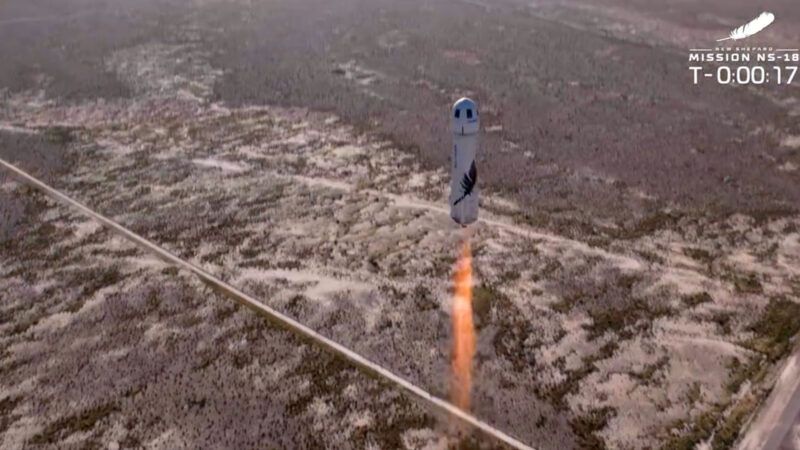After Becoming the Oldest Man To Visit Space, William Shatner Makes an Emotional Case for Private Space Tourism
Blue Origin's New Shepard capsule carried the 90-year-old former Star Trek actor and three crewmembers 66 miles above the Earth's surface.

Today, at age 90, actor William Shatner became the oldest person to travel into space aboard private space company Blue Origin's New Shepard capsule. His post-launch remarks about the transformative experience of private space tourism might make him one of the most compelling advocates for private space tourism.
"To see the blue cover whip by and now you're staring to into blackness," said a tearful Shatner—famous for playing Capt. James T. Kirk in Star Trek—to Blue Origin founder Jeff Bezos moments after planting his feet on Terra Firma in the West Texas desert. "There's the blue down there and the black up there. There is mother and Earth and comfort and there is, is there death? I don't know. Is that what death is? It was so moving."
The short 10-minute flight took Shatner and three fellow crew members 66 miles above the planet's surface, or just about the "Kármán line" that marks the boundary between Earth's atmosphere and space.
Shatner's past portrayal of the space-faring Kirk obviously made his travel into space today a surreal conversion of fantasy into reality. The launch also neatly illustrates the progress that's been made in space technology since he was only pretending to explore the stars.
When Star Trek first aired in the late 1960s, space travel was the exclusive domain of highly trained professional astronauts traveling aboard rockets built and funded by the massive government space programs of two superpowers primarily interested in supplementing their nuclear arms race with a propaganda victory or two.
Fast-forward to today, where Shatner's Blue Origin flight is only the latest milestone-setting launch of a burgeoning private space tourism industry.
Last month, Elon Musk's SpaceX sent the first all-civilian crew into orbit for a three-day, privately funded mission. That follows the company's successful Crew Dragon mission from last year, which carried two NASA astronauts to the International Space Station from American soil for the first time in over a decade.
Earlier this summer, Blue Origin and Richard Branson's Virgin Galactic both performed their first human flights into space (or close enough) with their billionaire founders on board.
Those latter flights attracted heated criticism from progressives who bemoaned the sad reality where billionaires spent their money pushing the envelope of space technology instead of improving the lives of ordinary people here on Earth. Better those funds be confiscated via a wealth tax and funneled into terrestrial government bureaucracies dedicated to real-world problems of health and education, they said.
It's true that space travel has yet to become a reality for the common man. At the moment, it's an option only for the ultra-wealthy, the mildly famous, and a few lucky lottery winners. The same can be said for the early iterations of many inventions that are now boringly commonplace, from automobiles to smartphones.
Innovations born from a capitalist process of innovation and competition have made all those things ubiquitous features of modern life, for both rich and poor. With enough time and low enough taxes, space flight will hopefully be an equally accessible activity.
Critics still might scoff that all that time and investment will only transform billionaires' vanity projects into glorified amusement rides for the less wealthy. But Shatner's own post-launch comments suggest that even his brief trip to space was far more than just a fun adventure.
"Everybody in the world needs to do this," he said, telling Bezos, "what you have given me is the most profound experience I can imagine. I am so filled with emotion about what just happened. I hope I never recover from this. I hope I can maintain what I feel now."
